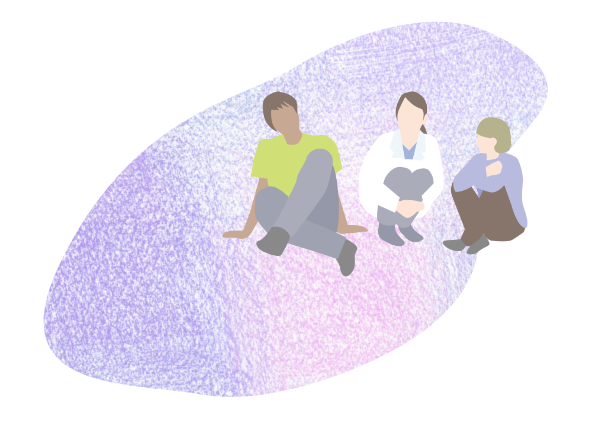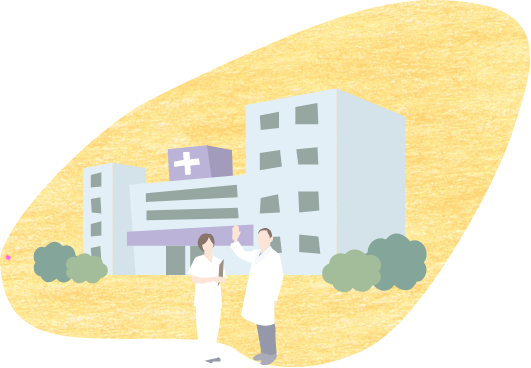Sexually-Transmitted Diseases (STDs)
Recently, I have genital itching. What should I do?
If you suspect you have been infected with an STD, visit your local health center or a healthcare institution with a specialist like an STD specialist, urologist, or gynecologist to get tested. Public health centers can only test for a few types of STDs, so you will still need to visit an appropriate healthcare institution for treatment if your test is positive. This is why we recommend going straight to a healthcare specialist or specialized healthcare institution (like an STD specialist, a gynecologist, or a women’s clinic) from the beginning if you suspect you have an STD. There are also cases in which women experience lighter symptoms or are asymptomatic compared to men, so anyone who is concerned should seek medical attention, even if they do not have noticeable symptoms. To learn more about STDs, please visit the Tokyo STD Navi. If you experience genital pain or itching after intercourse with your partner, we recommend you encourage your partner to also visit a healthcare institution. If one partner is diagnosed with an STD, make sure that both partners seek diagnosis and treatment
The difference between a gynecologist and an obstetrician-gynecologist
Gynecologist: A gynecologist treats women during times other than pregnancy and birth.
Obstetrician-gynecologist: An obstetrician-gynecologist (OB-GYN) combines “obstetrics,” which is related to pregnancy and childbirth, and “gynecology,” described above.
Women’s clinics: Many institutions called women’s clinics (or “ladies’ clinics”) provide the same basic services as an OB-GYN, but different clinics may specialize in different fields. Before you visit one, please check their website carefully.
I think I caught an STD!
I want to go to the hospital, but if I use my health insurance card, my parents might find out… What should I do?
For people who want to start by getting tested, please look up a public health center near you. They offer free, anonymous testing. Generally, HIV tests are available at every center and, depending on the location, testing may also be available for other STDs like chlamydia, syphilis, and gonorrhea. However, STDs cannot be detected if the test doesn’t cover them, and people who test positive have to visit a healthcare institution for treatment anyway. That is why we recommend visiting a public health center to people who just want to know if they have one of the STDs mentioned above. While it can depend on what type of health insurance you have, after you visit a healthcare institution, the insurance notification document only lists the name of the institution and the cost of the visit. This means if you go to a large general hospital, your parents will not be able to tell which department you visited. You can also receive medical treatment from a gynecologist, a women’s clinic, or other hospital at your own expense, although it will cost more.
How can I make sure I’m protected against STDs?
There are no guaranteed methods for sexually active people to completely prevent all STDs, but condoms are effective at preventing many of them when used as directed. STDs can also be transmitted through oral sex. Use condoms even during oral-genital contact.
Even if you have an exclusive partner, they may carry an infection acquired from a past partner. We recommend getting regular checkups at a healthcare institution or a health center, which were discussed in the answer to the previous question.
Sexual consent
I often hear the phrase “sexual consent” recently, but what does it mean?
Sexual consent refers to consent that should be sought and given before engaging in ANY sexual activity. Before engaging in sexual activities, it is important that both parties are actively willing to do so. There are three key elements of sexual consent:
1. It is safe to say NO (Free from coercion)
2. That the relationship between participants is equal and is not influenced by social status or power (Equal)
3. That consenting to one act does not mean consenting to another (Non-continuous)
Reference: NPO Chabujo, Sexual Consent Handbook.
Is sexual consent necessary even if you are dating?
Even with someone you are dating, sexual consent is necessary. It is also important to be considerate to each other and to not ignore signs like when someone is feeling unwell, is not expressing much interest, or has changed their mind partway through. No matter what the nature of the relationship is, be careful to maintain an environment in which the three key rules of sexual consent can be followed.
About menstruation
My period is so painful I can’t get out of bed. It’s detrimental to my life.
What methods are there for solving this?
First, go to a gynecologist or a women’s clinic for a consultation. Depending how much symptoms like menstrual pain, headaches, and nausea are disrupting your daily life, you may be diagnosed with dysmenorrhea. You will then be prescribed medications that can help relieve your symptoms. These include low-dose birth control, painkillers, and traditional herbal medicine. The doctor might also discover an invisible problem like endometriosis, so it’s best to get an examination so you can receive an early diagnosis and treatment. Also, if you visit a gynecologist or a women’s clinic on a regular basis, it will be easier to get treatment if something unexpected happens to you or to get a consultation if there is something about your body that concerns you.
My girlfriend is always in an irritable mood before she has her period. Why does that happen?
Many women experience difficulties in their lives due to Premenstrual Syndrome (PMS), which occurs three to ten days before menstruation. The time between ovulation and menstruation is called the luteal phase. During this phase, women’s bodies secrete large amounts of estrogen (follicle stimulating hormone) and progesterone (luteinizing hormone). It is believed that PMS is caused by an imbalance in hormones and neurotransmitters in the brain due to the sudden decrease in these hormones in the latter half of the luteal phase. Common symptoms of PMS include irritability, depression, anxiety, fatigue, poor concentration, and disrupted sleep patterns. (Source: Japan Society of Obstetrics and Gynecology website)
Based on this knowledge, please recognize that premenstrual irritability is something many women experience and suffer from and try to be more considerate than usual.
About low-dose birth control
What is low dose birth control (“the pill”)?
Low-dose birth control, commonly known as “the pill,” is a type of medicine that was developed to help women control pregnancy and menstruation. The World Health Organization (WHO) says that women can begin using low-dose birth control after menarche. You can continue using it until around age 50, close to menopause, but some physicians do not recommend taking low-dose birth control over age 40 due to the risk of thrombosis. Low-dose birth control can help regulate periods, manage excessive bleeding, and relieve menstrual pain and PMS. When taken properly and as directed, it also highly effective as a contraceptive with a 99.7% success rate.1 So, many women who suffer from menstrual pain or PMS or who want increased protection by using it together with condoms or other contraceptives take it to relieve menstruation-related problems and improve their quality of life.
1Contraceptive Technology, 20 ed., Ardent Media, 2011 Table 3-2.
Where can I get it? How much does it cost per month?
Currently, low-dose birth control is not available over the counter in Japan, but it can be prescribed by a doctor. If you want to start using it, you should visit an OB-GYN. While the price depends on the type, a single sheet (a 28 day supply) usually costs between 2,000 and 3,000 yen. For people diagnosed with dysmenorrhea, it is covered by insurance. The type prescribed depends on the intended use, so make sure to get a prescription from a healthcare institution instead of buying it online or through other sources without a diagnosis.
About unplanned pregnancy
Something went wrong with my contraception and I got pregnant. I’m still a student so I can’t raise a baby. What should I do?
First, consult someone around you, like a family member, so you are not all by yourself. If you are uncomfortable talking about it, there are a number of
consultation services for unplanned pregnancies you can call anonymously. They can tell you more about the specific options available to you so you can make a decision. However, there is a time limit on how long you can safely have an abortion. We recommend you visit a doctor for a consultation and an examination as soon as possible. Also, to avoid having another unplanned pregnancy in the future, you should talk to your partner about contraception and look up what methods you can use to protect yourself.
You can also receive a prescription for emergency contraception (also called the “morning-after pill”) soon after you notice your contraception has failed. It can be taken within 72 hours to reduce the chance of pregnancy. The sooner you take it, the lower your chances of getting pregnant. However, to get it, you must visit a healthcare professional to receive a prescription or visit a healthcare facility that provides emergency outpatient prescriptions for it. Also, emergency contraception is not 100% effective at preventing pregnancy.





